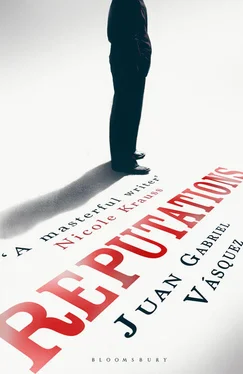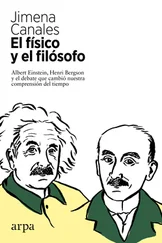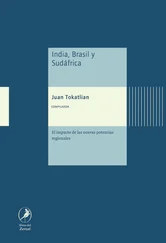‘Were I to be asked what ex-President Pastrana looks like,’ she said, ‘just as if I were asked what Franco or Arafat looked like, the image that forms in my head is not a photograph but a drawing by Maestro Mallarino. My idea of many people is what he has drawn, not what I have seen. It’s possible, no it’s certain that the same thing happens to many people here tonight.’ Mallarino listened to her with his gaze glued to the table, feeling people’s gazes on him like a hand, fidgeting with a non-existent ring: the ring that was once on his left ring finger and that Mallarino still felt the way amputees feel a missing limb. ‘In a sense,’ the Minister went on, ‘to be caricatured by Javier Mallarino is to have a political life. The politician who disappears from his drawings no longer exists. They go on to a better life. I’ve known many who have even told me: life after Mallarino is much better.’ The witticism was rewarded with a brief ripple of laughter. So the little lady has a sense of humour, thought Mallarino, and looked up; and in that instant, just as we will spot our own name lost in the middle of any page, Mallarino found Magdalena’s luminous face in the middle of the smiling multitude. She was smiling too, but hers was a melancholy smile, the smile of things lost. What was going on in her life? They hadn’t talked seriously for many years: they had agreed, with the solemnity of an international treaty, that mutual revelations about their private lives would only serve to complicate everything: to accelerate, like a bacteria, the decomposition of good memories, and to embitter Beatriz, whose adolescence had been a painstaking martyrdom in which she felt guilty about every one of the family’s misfortunes, and the rest of her life had been a stubborn and speedy headlong escape. For Mallarino, his daughter’s life choices — her Catholic, provincial husband, her career with Médecins Sans Frontières — were nothing but a sophisticated way to escape from her family, from that surname that always touched off embarrassing reactions, but also the painful experience of growing up as the daughter of a failed or broken couple. The only blemish on this night was the absence of Beatriz, who just that week had been obliged to make an unexpected trip to La Paz, and in a few days she’d be on a longer, more planned one to an unpronounceable village in Afghanistan, and between the two she’d drop by to see him or call so they could meet for lunch, and Mallarino knew, after that visit or that lunch, a desert of months and months without seeing her again would open before him. The Minister was suddenly talking about Greek glasses and essential strokes, using words like symbol, allegory and attribute , and Mallarino was remembering in the meantime a journalism seminar on editorial and opinion pages — with a pompous title and some grandiloquent guest speakers — where he was asked what he would change about his life and all he could think of was his relationship with Beatriz.
‘With the passage of time, over the forty years we’re here to celebrate today,’ the Minister was saying meanwhile, ‘the great Mallarino’s drawings have been getting sadder. His characters have hardened. His gaze has become more intransigent, more critical. And his cartoons, in general, have become more indispensable. I can’t imagine a life without Javier Mallarino’s daily cartoon, but nor can I imagine a country that could give itself the luxury of not having him.’ This, Mallarino admitted, had come out nicely: I wonder who writes her speeches. ‘And so today we are paying him this homage, a tiny recognition of an artist who has turned into the country’s critical conscience. Today we present him with this medal, the highest honour our nation confers, but we present him with something else too, Maestro: we have a little surprise for you.’ Behind the table, at the back of the stage, the white screen appeared again, and illuminated on it was an image: it was the caricature of himself that Mallarino had drawn forty years earlier, that ironic self-portrait that he’d used to defend himself from being censored and to begin his career at El Independiente . But there, on the screen, the image had a serrated frame, and above Mallarino’s bearded face, at the level of his glasses, there was a price. It was a stamp. ‘Maestro Mallarino,’ said the Minister, ‘allow me to present you with the first-day cover of the National Post Office’s new stamp, so that from now on letters mailed in our cities will also be a homage to your life and work.’ Mallarino saw the long hair spilling over her shoulders, the chest rising with nervous breaths, the hand that unleashed a jangle of bracelets as she handed him a black frame. From old habit, Mallarino identified the wood of the frame, the frosted glass and the foam-core board. In the centre of an enormous black space, deep as the night sky, was the stamp. The frame changed hands and the deluge of applause burst out for a second time. Mallarino noticed a slight tickle at the nape of his neck and the pit of his stomach. As he approached the lectern with the Colombian coat of arms, the flanks of which stuck out from behind like a bat’s ears, he realized he was moved.
‘Forty years,’ he said, leaning down towards the microphone that suddenly looked like a fly’s compound eye. ‘Forty years and more than ten thousand cartoons. And let me confess something to you all: I still don’t understand anything. Or perhaps things haven’t changed so much. In these forty years, it occurs to me now, there are at least two things that haven’t changed: first, what worries us; second, what makes us laugh. That’s still the same, it’s still the same as it was forty years ago, and I’m very much afraid that it’ll still be the same forty years from now. Good cartoons have a special relationship with time, with our time. Good caricatures seek and find the constant in a person: something that never changes, that stays the same and allows us to recognize someone we haven’t seen in a thousand years. Even if a thousand years go by, Tony Blair will still have big ears and Julio César Turbay will still wear a bow tie. They’re characteristics a person is grateful for. When a new politician has one of those characteristics, one immediately thinks: Please let him do something, let him do something so I can use it, so that feature won’t be lost to the world’s memory. One thinks: Please, don’t let him be honest, don’t let him be prudent, don’t let him be a good politician, because then I won’t be able to use him so frequently.’ A whisper of laughter could be heard, thin like the sound before a scandal. ‘Of course, there are politicians without distinctive features: absent faces. They’re the most difficult, because they have to be invented, and so I do them a favour: they have no personality, and I give them one. They should be grateful. I don’t know why, but they almost never are.’ Sudden guffaws bubbled up around the theatre. Mallarino waited until the auditorium returned to respectful silence again. ‘No, they almost never are. But one has to get the idea out of one’s head that it might matter. Great caricaturists don’t expect applause from anyone, and that’s not what they draw for: they draw to annoy, to embarrass, to be insulted. I have been insulted, I’ve been threatened, I’ve been declared persona non grata , I’ve been denied entry to restaurants, I’ve been excommunicated. And the only thing I always say, my only response to the complaints and aggression, is this: political cartoons might exaggerate reality, but they can’t invent it. They can distort, but never lie.’ Mallarino paused theatrically, awaited applause and the applause arrived. He raised his eyes, looked up at the gods and remembered having sat up there, at eighteen, the first time he brought a date to the Colón (a production of Verdi’s Un ballo in maschera ), and then he looked back at the orchestra, searching for Magdalena, wanting to see the admiration on her face that he’d seen from time to time, that unconditional admiration that had once been his nourishment and objective. His gaze fluttered around in space like a moth.
Читать дальше












